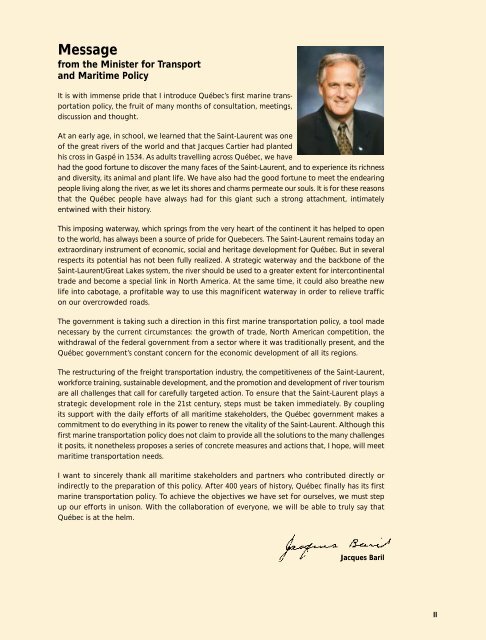Québec Marine Transportation Policy - Transport - Gouvernement ...
Québec Marine Transportation Policy - Transport - Gouvernement ...
Québec Marine Transportation Policy - Transport - Gouvernement ...
Create successful ePaper yourself
Turn your PDF publications into a flip-book with our unique Google optimized e-Paper software.
Message<br />
from the Minister for <strong>Transport</strong><br />
and Maritime <strong>Policy</strong><br />
It is with immense pride that I introduce <strong>Québec</strong>’s first marine transportation<br />
policy, the fruit of many months of consultation, meetings,<br />
discussion and thought.<br />
At an early age, in school, we learned that the Saint-Laurent was one<br />
of the great rivers of the world and that Jacques Cartier had planted<br />
his cross in Gaspé in 1534. As adults travelling across <strong>Québec</strong>, we have<br />
had the good fortune to discover the many faces of the Saint-Laurent, and to experience its richness<br />
and diversity, its animal and plant life. We have also had the good fortune to meet the endearing<br />
people living along the river, as we let its shores and charms permeate our souls. It is for these reasons<br />
that the <strong>Québec</strong> people have always had for this giant such a strong attachment, intimately<br />
entwined with their history.<br />
This imposing waterway, which springs from the very heart of the continent it has helped to open<br />
to the world, has always been a source of pride for Quebecers. The Saint-Laurent remains today an<br />
extraordinary instrument of economic, social and heritage development for <strong>Québec</strong>. But in several<br />
respects its potential has not been fully realized. A strategic waterway and the backbone of the<br />
Saint-Laurent/Great Lakes system, the river should be used to a greater extent for intercontinental<br />
trade and become a special link in North America. At the same time, it could also breathe new<br />
life into cabotage, a profitable way to use this magnificent waterway in order to relieve traffic<br />
on our overcrowded roads.<br />
The government is taking such a direction in this first marine transportation policy, a tool made<br />
necessary by the current circumstances: the growth of trade, North American competition, the<br />
withdrawal of the federal government from a sector where it was traditionally present, and the<br />
<strong>Québec</strong> government’s constant concern for the economic development of all its regions.<br />
The restructuring of the freight transportation industry, the competitiveness of the Saint-Laurent,<br />
workforce training, sustainable development, and the promotion and development of river tourism<br />
are all challenges that call for carefully targeted action. To ensure that the Saint-Laurent plays a<br />
strategic development role in the 21st century, steps must be taken immediately. By coupling<br />
its support with the daily efforts of all maritime stakeholders, the <strong>Québec</strong> government makes a<br />
commitment to do everything in its power to renew the vitality of the Saint-Laurent. Although this<br />
first marine transportation policy does not claim to provide all the solutions to the many challenges<br />
it posits, it nonetheless proposes a series of concrete measures and actions that, I hope, will meet<br />
maritime transportation needs.<br />
I want to sincerely thank all maritime stakeholders and partners who contributed directly or<br />
indirectly to the preparation of this policy. After 400 years of history, <strong>Québec</strong> finally has its first<br />
marine transportation policy. To achieve the objectives we have set for ourselves, we must step<br />
up our efforts in unison. With the collaboration of everyone, we will be able to truly say that<br />
<strong>Québec</strong> is at the helm.<br />
Jacques Baril<br />
II


